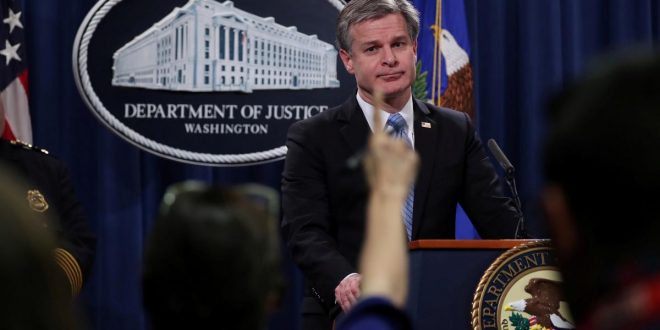Private
During a one-hour speech at a think tank in Washington on Tuesday, FBI chief Christopher Wray threw some of the agency’s harshest accusations about China’s threat to the US.
He said that acts of theft and espionage by China’s government represent the “greatest long-term threat to our nation’s information and intellectual property and to our economic vitality”. He noted that the FBI currently has more than 2000 open investigations related to China’s government, which is almost half the number of the total active counterintelligence cases.
Chinese hackers have swiftly targeted US pharmaceutical and research institutions making progress in the fight against coronavirus, FBI chief said. He explained how the FBI has detected “cyber activity tracing back to China” directed at US organizations that have made substantial announcements about research concerning the coronavirus pandemic, within hours of their announcements.
Federal, state and local officials across the country are also being “aggressively urged” by Chinese diplomats to support China’s crisis management, Wray said, adding that a state senator had recently been asked by the Chinese government to announce a resolution supporting the country’s response to the pandemic.
“China is engaged in a whole-of-state effort to become the world’s only superpower by any means necessary” Mr. Wray said.
He also affirmed that Chinese President Xi Jinping has a “spearheaded” campaign geared at Chinese nationals living abroad who are seen as threats to the Chinese government. The program known as “Fox Hunt” has targeted hundreds of people in the US with “chocking tactics” Wray said.
“When it couldn’t locate one Fox Hunt target, the Chinese government sent an emissary to visit the target’s family here in the United States. The message they said to pass on? The target had two options: return to China promptly, or commit suicide,” he explained, calling listeners who believe they had been targeted by the program to reach out for the FBI.
The program originally started in 2015 to target people accused of corruption and led to capture of hundreds of fugitives. The Chinese have defended it as a legitimate anti-corruption effort, even after reports emerged in 2015 that the Obama administration had warned the government against deploying their law enforcement officials in the US to look for dissidents.
Wray also explained how the Chinese are carrying out a “sophisticated malign influence campaign” using “bribery, blackmail and covert deals” to influence public discourse and government policy. For example, China has threatened to cut ties with US manufacturers based in the district of elected officials planning to travel to Taiwan. China has also attempted to designate trusted advisers to US policymakers to carry their message about the regime, Wray said.
He added that the influence efforts are not aimed specifically at impacting the presidential election, but they do have implications for the vote and the Chinese “certainly have preferences that go along with that.”
These accusations come amid heightened tensions between the US and China.
US President Donald Trump has been extremely critical of China amid the coronavirus outbreak, constantly blaming the country for the global pandemic. In another move, Secretary of State Mike Pompeo said earlier this week that the administration was looking at banning Chinese apps – including the hugely popular TikTok.
Directorate of Lebanese Studies and Publications
Romy Harfouche
 Lebanese Ministry of Information
Lebanese Ministry of Information



